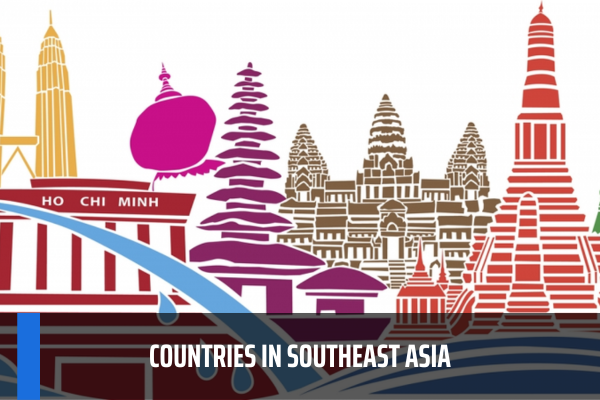Which countries are in Southeast Asia? What are the capitals of countries in Southeast Asia?
- Which countries are in Southeast Asia? What are the capitals of countries in Southeast Asia?
- What are the employment formats for Vietnamese guest workers to work in other Southeast Asian countries?
- What are the rights and obligations of Vietnamese guest workers working in other Southeast Asian countries?
Which countries are in Southeast Asia? What are the capitals of countries in Southeast Asia?
Southeast Asia is a subregion located in the Southeast of Asia, bordering the Pacific and Indian Oceans. This is an important geographical region, a bridge between the Eurasian continent and the Australian continent, including an extremely complex system of islands, peninsulas, and archipelagos interwoven between seas and bays.
The Southeast Asia region includes 11 countries, which are:
(1) Brunei
(2) Cambodia
(3) Timor-Leste
(4) Indonesia
(5) Laos
(6) Malaysia
(7) Myanmar
(8) Philippines
(9) Singapore
(10) Thailand
(11) Vietnam.
Of these, 10 countries are official members of the ASEAN Organization and the remaining country is an observer of this organization (East Timor).
The capitals of 11 Southeast Asian countries include the following:
No. | Countries | Capitals |
1 | Indonesia | Jakarta |
2 | Myanmar | Naypyidaw |
3 | Thailand | Bangkok |
4 | Vietnam | Hanoi |
5 | Malaysia | Kuala Lumpur and Putrajaya (administrative capital) |
6 | Philippines | Manila |
7 | Campuchia | Phnom Penh |
8 | Laos | Vientiane |
9 | Timor-Leste | Dili |
10 | Brunei | Bandar Seri Begawan |
11 | Singapore | Singapore |

Which countries are in Southeast Asia? What are the capitals of countries in Southeast Asia? (Picture from internet)
What are the employment formats for Vietnamese guest workers to work in other Southeast Asian countries?
Pursuant to Article 5 of the Law on Vietnamese guest workers 2020 stipulates as follows:
Employment format for Vietnamese guest workers
1. Contracts for bringing Vietnamese workers to work abroad signed with service providers for implementation of international agreements.
2. Contracts or written agreements regarding bringing Vietnamese workers to work abroad signed with any of following enterprises, organizations and individuals:
a) Vietnamese enterprises providing guest worker service;
b) Vietnamese enterprises awarded with contracts for foreign constructions and/or projects;
c) Vietnamese enterprises bringing Vietnamese workers abroad for training, improvement and enhancement;
d) Vietnamese organizations and individuals making outward investment.
3. Employment contracts between Vietnamese workers and foreign employers.
Thus, the employment formats for Vietnamese guest workers to work in other Southeast Asian countries include:
(1) Through public service providers
Contracts for bringing Vietnamese workers to work abroad signed with service providers for implementation of international agreements.
(2) Through guest worker service
Contract or written agreement on sending Vietnamese workers to work Contracts or written agreements regarding bringing Vietnamese workers to work abroad signed with any of following enterprises, organizations and individuals:
- Vietnamese enterprises providing guest worker service;
- Vietnamese enterprises awarded with contracts for foreign constructions and/or projects;
- Vietnamese enterprises bringing Vietnamese workers abroad for training, improvement and enhancement;
- Vietnamese organizations and individuals making outward investment.
(3) Through employment contracts concluded with foreign employers
Employment contracts between Vietnamese workers and foreign employers.
What are the rights and obligations of Vietnamese guest workers working in other Southeast Asian countries?
Pursuant to Article 6 of the Law on Vietnamese guest workers 2020, regulations on the rights and obligations of Vietnamese guest workers working in other Southeast Asian countries include the following:
Vietnamese guest workers shall have rights to:
- be provided with Vietnamese regulations and law on Vietnamese guest workers; policies, laws, customs and traditions of host countries related to the workers; rights and obligations of parties when working abroad;
- be advised and assisted to execute rights, obligations and receive benefits under employment contracts and vocational training contracts;
- benefit from salary, wages, medical examination and treatment policies, social insurance, occupational accident insurance, other policies according to employment contracts; inward transfer of salary, wages, income and other legal assets of individuals according to regulations and law of Vietnam and host countries;
- be protected in terms of legal rights and benefits during period of working abroad under contracts conforming to regulations and law of Vietnam and host countries and international practices;
- unilaterally terminate employment contracts if workers are bused, exploited by employers, facing life-threatening risks or sexual harassment during period of working abroad;
- benefits from policies assisting labor, occupation and rights from Fund for overseas employment as per the law;
- not pay social insurance or person income tax twice in Vietnam and host countries if Vietnam and the host countries have entered into agreements on social insurance or double taxation agreements;
- complain, accuse and file lawsuits against violations to regulations and law in bringing Vietnamese workers abroad;
- be advised, assisted in terms of employment and start-up after repatriating and access voluntary social psychological consulting service.
Vietnamese guest workers shall have obligations to:
- comply with regulations and law of Vietnam and host countries;
- preserve and emphasize culture and traditions of Vietnam; respect traditions and customs of host countries; cooperate with workers in host countries;
- complete orientation education course before working abroad;
- submit service fees and deposit payments as specified under this Law;
- work as pert the law; comply with labor discipline and regulations; comply with management, administration and supervision of foreign employers according to employment contracts;
- compensate for violations of signed contracts according to regulations and law of Vietnam and host countries;
- repatriate in a timely manner after terminating employment contracts and vocational training contracts; inform residence registration authorities before working abroad or after repatriating according to Law on Residence within 15 days from the date of repatriation;
- submit tax and participate in social insurance and other forms of insurance according to regulations and law of Vietnam and host countries;
- contribute the fund for overseas employment.
LawNet